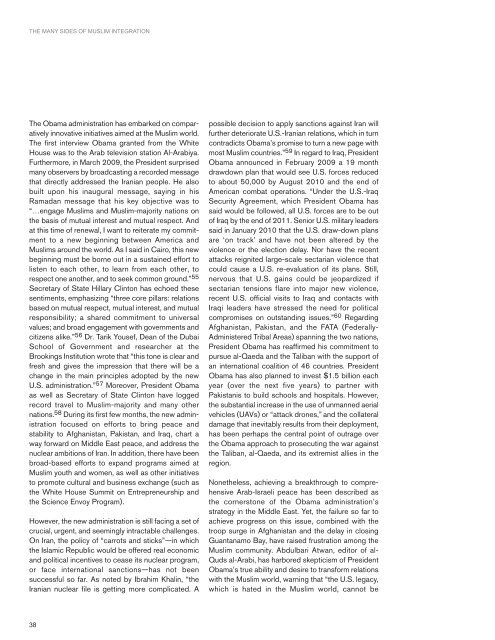the many sides of muslim integration: a german- american - aicgs
the many sides of muslim integration: a german- american - aicgs
the many sides of muslim integration: a german- american - aicgs
You also want an ePaper? Increase the reach of your titles
YUMPU automatically turns print PDFs into web optimized ePapers that Google loves.
<strong>the</strong> <strong>many</strong> <strong>sides</strong> <strong>of</strong> <strong>muslim</strong> <strong>integration</strong><br />
The Obama administration has embarked on comparatively<br />
innovative initiatives aimed at <strong>the</strong> Muslim world.<br />
The first interview Obama granted from <strong>the</strong> White<br />
House was to <strong>the</strong> Arab television station Al-Arabiya.<br />
Fur<strong>the</strong>rmore, in March 2009, <strong>the</strong> President surprised<br />
<strong>many</strong> observers by broadcasting a recorded message<br />
that directly addressed <strong>the</strong> Iranian people. He also<br />
built upon his inaugural message, saying in his<br />
Ramadan message that his key objective was to<br />
“…engage Muslims and Muslim-majority nations on<br />
<strong>the</strong> basis <strong>of</strong> mutual interest and mutual respect. And<br />
at this time <strong>of</strong> renewal, I want to reiterate my commitment<br />
to a new beginning between America and<br />
Muslims around <strong>the</strong> world. As I said in Cairo, this new<br />
beginning must be borne out in a sustained effort to<br />
listen to each o<strong>the</strong>r, to learn from each o<strong>the</strong>r, to<br />
respect one ano<strong>the</strong>r, and to seek common ground.” 55<br />
Secretary <strong>of</strong> State Hillary Clinton has echoed <strong>the</strong>se<br />
sentiments, emphasizing “three core pillars: relations<br />
based on mutual respect, mutual interest, and mutual<br />
responsibility; a shared commitment to universal<br />
values; and broad engagement with governments and<br />
citizens alike.” 56 Dr. Tarik Yousef, Dean <strong>of</strong> <strong>the</strong> Dubai<br />
School <strong>of</strong> Government and researcher at <strong>the</strong><br />
Brookings Institution wrote that “this tone is clear and<br />
fresh and gives <strong>the</strong> impression that <strong>the</strong>re will be a<br />
change in <strong>the</strong> main principles adopted by <strong>the</strong> new<br />
U.S. administration.” 57 Moreover, President Obama<br />
as well as Secretary <strong>of</strong> State Clinton have logged<br />
record travel to Muslim-majority and <strong>many</strong> o<strong>the</strong>r<br />
nations. 58 During its first few months, <strong>the</strong> new administration<br />
focused on efforts to bring peace and<br />
stability to Afghanistan, Pakistan, and Iraq, chart a<br />
way forward on Middle East peace, and address <strong>the</strong><br />
nuclear ambitions <strong>of</strong> Iran. In addition, <strong>the</strong>re have been<br />
broad-based efforts to expand programs aimed at<br />
Muslim youth and women, as well as o<strong>the</strong>r initiatives<br />
to promote cultural and business exchange (such as<br />
<strong>the</strong> White House Summit on Entrepreneurship and<br />
<strong>the</strong> Science Envoy Program).<br />
However, <strong>the</strong> new administration is still facing a set <strong>of</strong><br />
crucial, urgent, and seemingly intractable challenges.<br />
On Iran, <strong>the</strong> policy <strong>of</strong> “carrots and sticks”—in which<br />
<strong>the</strong> Islamic Republic would be <strong>of</strong>fered real economic<br />
and political incentives to cease its nuclear program,<br />
or face international sanctions—has not been<br />
successful so far. As noted by Ibrahim Khalin, “<strong>the</strong><br />
Iranian nuclear file is getting more complicated. A<br />
38<br />
possible decision to apply sanctions against Iran will<br />
fur<strong>the</strong>r deteriorate U.S.-Iranian relations, which in turn<br />
contradicts Obama’s promise to turn a new page with<br />
most Muslim countries.” 59 In regard to Iraq, President<br />
Obama announced in February 2009 a 19 month<br />
drawdown plan that would see U.S. forces reduced<br />
to about 50,000 by August 2010 and <strong>the</strong> end <strong>of</strong><br />
American combat operations. “Under <strong>the</strong> U.S.-Iraq<br />
Security Agreement, which President Obama has<br />
said would be followed, all U.S. forces are to be out<br />
<strong>of</strong> Iraq by <strong>the</strong> end <strong>of</strong> 2011. Senior U.S. military leaders<br />
said in January 2010 that <strong>the</strong> U.S. draw-down plans<br />
are ‘on track’ and have not been altered by <strong>the</strong><br />
violence or <strong>the</strong> election delay. Nor have <strong>the</strong> recent<br />
attacks reignited large-scale sectarian violence that<br />
could cause a U.S. re-evaluation <strong>of</strong> its plans. Still,<br />
nervous that U.S. gains could be jeopardized if<br />
sectarian tensions flare into major new violence,<br />
recent U.S. <strong>of</strong>ficial visits to Iraq and contacts with<br />
Iraqi leaders have stressed <strong>the</strong> need for political<br />
compromises on outstanding issues.” 60 Regarding<br />
Afghanistan, Pakistan, and <strong>the</strong> FATA (Federally-<br />
Administered Tribal Areas) spanning <strong>the</strong> two nations,<br />
President Obama has reaffirmed his commitment to<br />
pursue al-Qaeda and <strong>the</strong> Taliban with <strong>the</strong> support <strong>of</strong><br />
an international coalition <strong>of</strong> 46 countries. President<br />
Obama has also planned to invest $1.5 billion each<br />
year (over <strong>the</strong> next five years) to partner with<br />
Pakistanis to build schools and hospitals. However,<br />
<strong>the</strong> substantial increase in <strong>the</strong> use <strong>of</strong> unmanned aerial<br />
vehicles (UAVs) or “attack drones,” and <strong>the</strong> collateral<br />
damage that inevitably results from <strong>the</strong>ir deployment,<br />
has been perhaps <strong>the</strong> central point <strong>of</strong> outrage over<br />
<strong>the</strong> Obama approach to prosecuting <strong>the</strong> war against<br />
<strong>the</strong> Taliban, al-Qaeda, and its extremist allies in <strong>the</strong><br />
region.<br />
None<strong>the</strong>less, achieving a breakthrough to comprehensive<br />
Arab-Israeli peace has been described as<br />
<strong>the</strong> cornerstone <strong>of</strong> <strong>the</strong> Obama administration’s<br />
strategy in <strong>the</strong> Middle East. Yet, <strong>the</strong> failure so far to<br />
achieve progress on this issue, combined with <strong>the</strong><br />
troop surge in Afghanistan and <strong>the</strong> delay in closing<br />
Guantanamo Bay, have raised frustration among <strong>the</strong><br />
Muslim community. Abdulbari Atwan, editor <strong>of</strong> al-<br />
Quds al-Arabi, has harbored skepticism <strong>of</strong> President<br />
Obama’s true ability and desire to transform relations<br />
with <strong>the</strong> Muslim world, warning that “<strong>the</strong> U.S. legacy,<br />
which is hated in <strong>the</strong> Muslim world, cannot be





